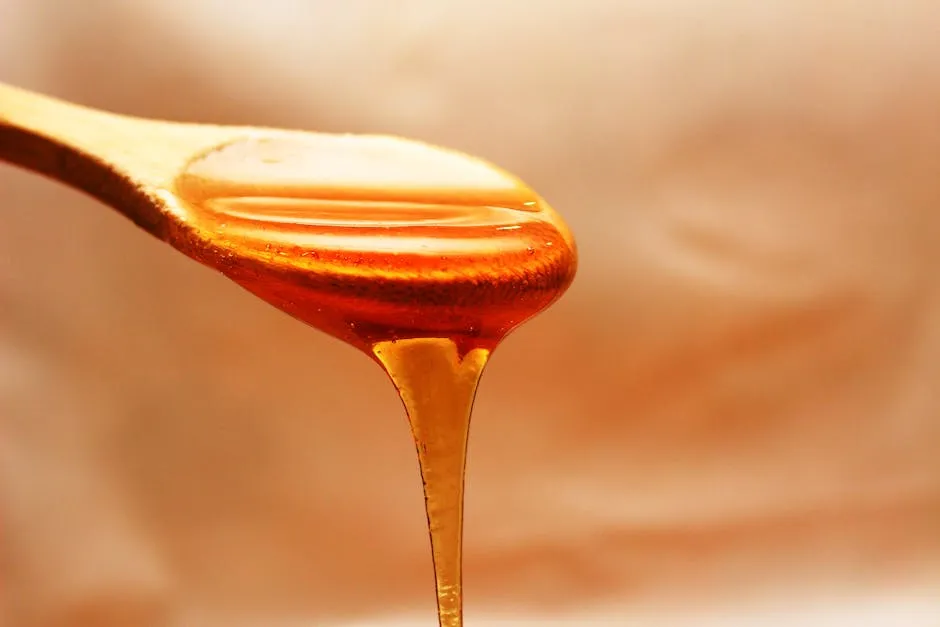Introduction
Honey is a beloved natural sweetener for many. We use it in tea, baking, and as a tasty drizzle. But what about our furry friends? Many dog owners wonder if honey is safe for their pets. This article will cover the safety, benefits, and best practices for feeding honey to dogs.
Summary and Overview
Honey is rich in natural sugars, vitamins, and minerals. It contains antioxidants that support overall health. For dogs, honey can offer potential benefits like antimicrobial properties and soothing effects. However, it’s essential to approach honey with caution. Not all dogs should have it, and moderation is key. Too much honey can lead to health issues, especially for dogs with specific conditions. Always consult your vet before adding honey to your dog’s diet, ensuring it’s safe and beneficial for them.

Speaking of sweet additions, if you’re looking for a delicious and healthy option for your furry friend, consider Raw Honey (Organic). It’s a natural choice packed with nutrients and can be a great occasional treat for your dog!
Is Honey Safe for Dogs?
Honey is generally safe for dogs. It’s a natural sweetener and non-toxic when given in moderation. However, moderation is crucial due to honey’s high sugar content. Honey is about 82% sugar, which is higher than many other sweeteners. Excessive sugar can lead to obesity, dental issues, and diabetes in dogs.
Raw honey presents additional risks. It can contain botulism spores, which are harmful to puppies and dogs with weakened immune systems. For healthy adult dogs, pasteurized honey is safer since it’s processed to remove potential bacteria. Always monitor your dog’s reaction when introducing honey and consult your veterinarian for specific advice.
Looking for a way to ensure your dog gets their honey fix without the mess? A Honey Dispenser is a great tool to have in your kitchen! It allows you to drizzle the perfect amount of honey on your dog’s food without creating a sticky situation in your kitchen.
Nutritional Benefits of Honey
Honey is more than just a sweet treat; it’s packed with nutrients. It contains vitamin C, essential for immune support and tissue repair. B vitamins, such as niacin and riboflavin, help with metabolism and energy production. Minerals like calcium and potassium play a crucial role in maintaining strong bones and regulating bodily functions.

Honey is also rich in antioxidants. These compounds help protect your dog’s cells from damage caused by free radicals. Studies show that honey can have high antioxidant levels, making it a fantastic addition to your dog’s diet.
When comparing honey to other natural sweeteners, honey stands out. Unlike refined sugars, honey offers health benefits while satisfying your dog’s sweet tooth. Just remember to use it as a supplemental treat, ensuring your furry friend enjoys its goodness without excessive sugar intake.
And while you’re on the topic of health, consider enhancing your dog’s diet with Organic Coconut Oil for Dogs. It’s known for its numerous health benefits, including promoting a shiny coat and aiding digestion!
Risks of Feeding Honey to Dogs
While honey can be beneficial, it also carries risks when overconsumed. Honey is high in sugar, leading to several health issues, especially in dogs. Obesity is a major concern, with approximately 56% of dogs in the U.S. classified as overweight or obese. Excessive sugar intake can contribute to weight gain and related problems.

Dental health is another area impacted by honey. Sugars may lead to tooth decay if proper dental care isn’t maintained. Dogs that consume honey regularly should have their teeth brushed to prevent plaque buildup. For more information on maintaining your dog’s dental health, check out Understanding canine dental health and home care tips.
And when it comes to keeping your dog’s teeth clean, consider investing in Dog Dental Chews. They help reduce plaque and tartar buildup, keeping your pup’s smile bright!
Certain dog populations need special attention. Diabetic dogs should avoid honey, as it can spike blood sugar levels. Overweight dogs also risk exacerbating their condition with sugary treats. Puppies and senior dogs with compromised immune systems should avoid raw honey due to potential botulism spores.
Additionally, some dogs may experience allergic reactions to honey, resulting in symptoms like itching or gastrointestinal upset. Always monitor your dog’s health and consult a veterinarian if you’re unsure about introducing honey into their diet.
Recommended Honey Intake for Dogs
To safely enjoy honey, moderation is key. As a general rule, treats should not exceed 10% of a dog’s daily intake. The following chart outlines recommended honey amounts based on dog size:
- Extra-small dogs (2-20 pounds): 1/4 teaspoon daily
- Small dogs (21-30 pounds): 1/2 teaspoon daily
- Medium dogs (31-50 pounds): 1 teaspoon daily
- Large dogs (51-90 pounds): 2 teaspoons daily
- Extra-large dogs (91+ pounds): 1 tablespoon daily
Begin with small amounts and observe your dog’s reaction. Monitor for any adverse effects, such as digestive issues or changes in behavior. If your dog shows any signs of discomfort, stop serving honey immediately and consult your veterinarian. This cautious approach ensures your furry friend enjoys the sweet treat safely!

Creative Ways to Feed Honey to Dogs
Looking for fun ways to share honey with your furry friend? Here are some creative serving methods that can make honey a delightful addition to your dog’s diet.
First, you can offer a direct spoonful of honey. Measure a small amount, and let your dog lick it off. This is an easy way to treat them and can be especially soothing for a mild cough.

Mixing honey into their food is another great option. Just drizzle a little over their regular meal to add some sweetness. Your dog might find mealtime even more exciting!
Frozen treats are a fantastic way to cool off on hot days. Simply mix honey with water or yogurt and freeze it in Ice Cube Trays. Give them a refreshing treat they’ll love!
Homemade dog biscuits with honey are a hit, too. You can incorporate honey into your favorite homemade dog treat recipes. Try adding honey to peanut butter or oatmeal biscuits for a nutritious snack.
And while you’re at it, a Dog Treats Cookbook can inspire you with a variety of recipes that include honey and other dog-friendly ingredients!
Finally, consider using honey as a topping for dog-safe fruits like bananas or apples. It adds a tasty twist to their healthy snacks.
What are your favorite ways to give honey to your dogs? Share your recipes or experiences in the comments!
Conclusion
In moderation, honey can be a beneficial treat for dogs. It provides vitamins and antioxidants that support their health. However, always consult your veterinarian before introducing new foods into your dog’s diet. They can guide you on safe options tailored to your dog’s needs. Enjoy treating your furry friend with this sweet addition!
FAQs
And to keep your dog safe and sound during your adventures, consider getting a Dog First Aid Kit. It’s always best to be prepared for any situation!
Please let us know what you think about our content by leaving a comment down below!
Thank you for reading till here 🙂
If you’re interested in learning more about whether honey is safe for dogs, check out this article on can dogs have honey.
All images from Pexels





